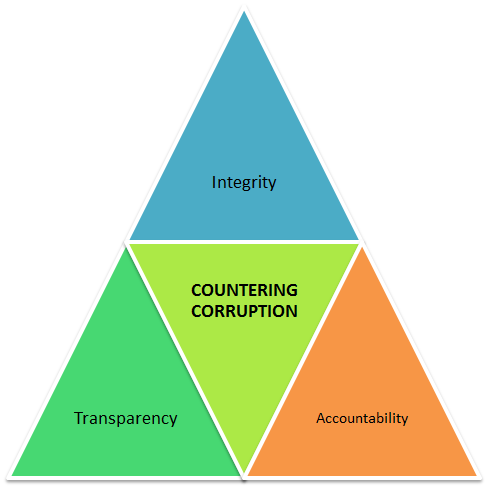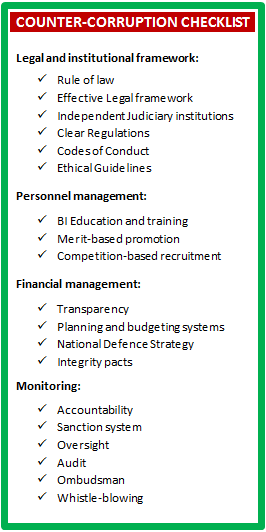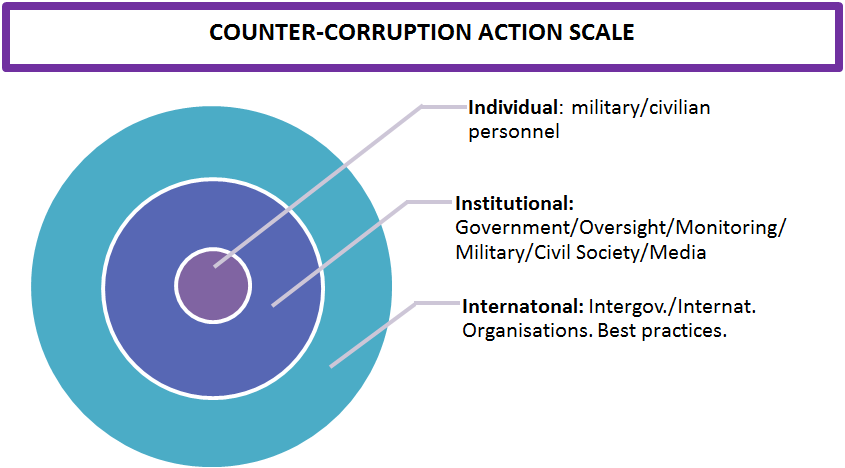Anti-Corruption or Counter-Corruption measures consist of three main dimensions:
- Integrity
- Transparency
- Accountability
According to CIDS’s Integrity Action Plan, counter-corruption measures include preventive actions that reduce the incentives and opportunities for corruption and other unethical behaviour to occur. They can also include pro-active enforcement of rules and regulations. That is: controlling, overseeing, and investigating suspected corrupt activities and individuals as well as prosecuting later via a legal authority.
What is anti/counter-corruption?
Countering corruption and Building Integrity (BI) are two sides of the same coin. While “Counter-corruption” or “Anti-corruption” concepts tend to be perceived in a negative light, “Building integrity” suggests a more positive dimension of what is, essentially, the same process. Integrity, according to CIDS, is the quality of being guided by strong principles, or being fully operational, intact and internally consistent in the application of agreed-upon principles and standards. Building integrity measures are, therefore, designed to enhance this quality. Counter-corruption measures, as mentioned before, include both positive and negative enforcement procedures, in other words, preventive and corrective dimensions. These are also found in BI programmes.
Why is it important?
Corruption is detrimental to the development, good governance, and social well-being of a country. Corruption in the security sector is especially grave since this sector, generally, represents a major part of a state’s budget. This means that other essential sectors, such as education and health, are left with fewer, if any, much needed resources. The effects of security sector corruption can result in insecurity, regional instability, and fuel conflicts. Counter-corruption efforts should, therefore, be undertaken on an international scale and should profit from regional and international cooperation. Moreover, successful Counter-corruption programmes are built and implemented from a holistic point of view and within a broader, Good Governance framework. Any country aspiring to have a functional, effective, and efficient security sector ought to have a BI/Counter-corruption programme in place.
How does it work?
There is a wide range of measures that can be put into practice in order to prevent and counter corruption. They can be coercive, voluntary, preventive, and corrective. As a first step to any BI/Counter-corruption programme, a thorough assessment of risk-areas is needed. DCAF, NATO, and CIDS, among others, have issued self-assessment questionnaires, guides, tools, and a variety of other knowledge-products for that purpose. These organisations also provide guidance and training for BI and Anti-Corruption programmes and policies creation and implementation. Following the risk-assessment phase, an action plan, or programme should be created. This programme should be adapted to the needs and context of a particular case. However, even if BI/Counter-corruption programmes should be considered on a case-by-case basis, a checklist of work areas, techniques, methods, and best practices can be of general use:
- Rule of law
- Effective Legal framework
- Efficient and independent judiciary institutions
- Clear and concise regulations
- Education and training focused on BI
- Codes of Conduct and Ethical Guidelines
- Merit and competition-based recruitment and promotion systems
- Transparency (budgets, salaries, procurement, acquisition, disclosure of assets)
- Planning and budgeting systems in accordance with national needs and objectives (National Security Strategy)
- Integrity pacts
- Accountability (effective, proportionate and dissuasive sanctions)
- Oversight mechanisms (internal and external)
- Audit function
- Ombudsman
- Monitoring mechanisms
- Whistle-blower mechanisms and protection
Who is involved in anti-corruption measures?
Generally, anti-corruption measures are part of a broader, Good Governance policy and involve a wide range of actors. Given that building integrity measures focus greatly on the behavioural factor, actors involved in the process range from soldier/citizen all the way to governmental, regional, and international organisations. Individuals, such as citizens, soldiers, whistle-blowers, leaders, inspectors, ombudsman, etc., are all responsible for following codes of conduct and acting in a way that is compatible with integrity standards. Institutions, such as Parliaments, Government agencies and Ministries, Ombuds, Audit and Oversight institutions, etc., are responsible for elaborating, implementing and overseeing the fulfilment of policies, plans, programmes, laws and regulations. National bodies, such as Government, Military, Private entities involved in procurement and other procedures, the Media, Academia and Civil Society Organisations are also responsible for the implementation of integrity values, oversight and scrutiny of processes, and results. Finally, international entities, such as intergovernmental and international organisations, can provide guidance and best practices.
Key Sources
Centre for Integrity in the Defence Sector. Criteria for good governance in the defence sector. International standards and principles (2015)
Centre for Integrity in the Defence Sector. Integrity Action Plan. A handbook for practitioners in defence establishments (2014)
CIDS (2015) Guides to Good Governance: Professionalism and integrity in the public service. No 1.
DCAF(2009), Backgrounder. Security Sector Governance and Reform. See new Backgrounder series here.
DCAF (2015), Parliamentary Brief: Building integrity in Defence.
NATO-DCAF, (2010). Building Integrity and Reducing Corruption in Defence. A Compendium of Best Practices.
Transparency International (2011). Building Integrity and Countering Corruption In Defence and Security. 20 Practical Reforms.
Additional sources
Centre for Integrity in the Defence Sector: Guides to Good Governance
DCAF – UNDP (2008) Public Oversight of the Security Sector. A Handbook for Civil Society Organizations.
NATO (2015), Building Integrity Self-Assessment Questionnaire and Peer Review Process. A diagnostic tool for national defence establishments.
NATO (2012) Building Integrity Programme
NATO-DCAF (2009). Integrity Self-Assessment Process: A Diagnostic Tool for National Defence Establishments.





